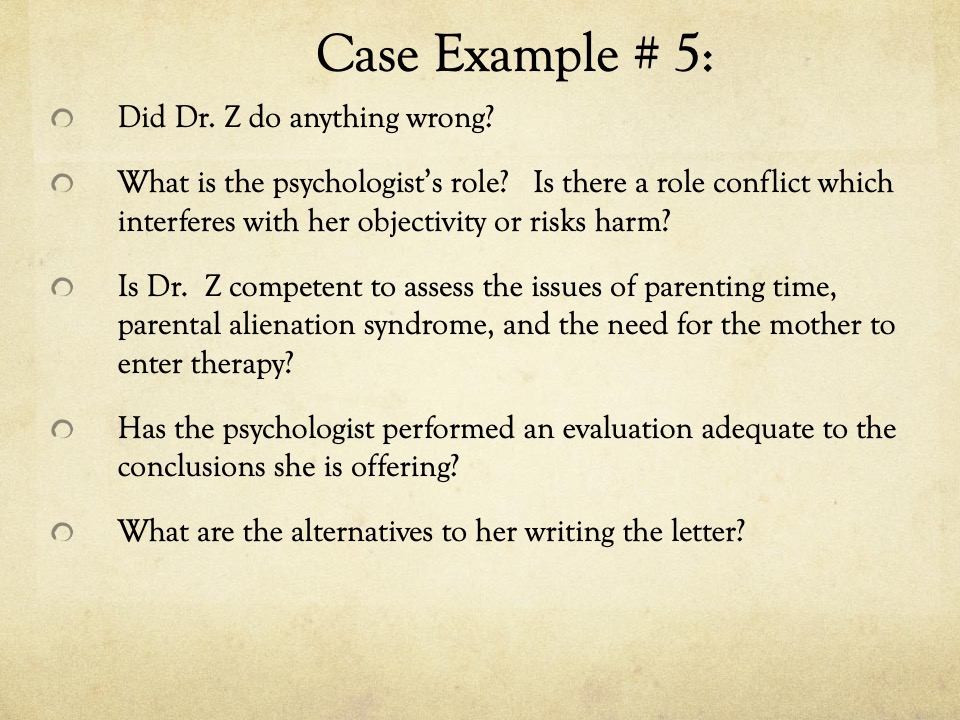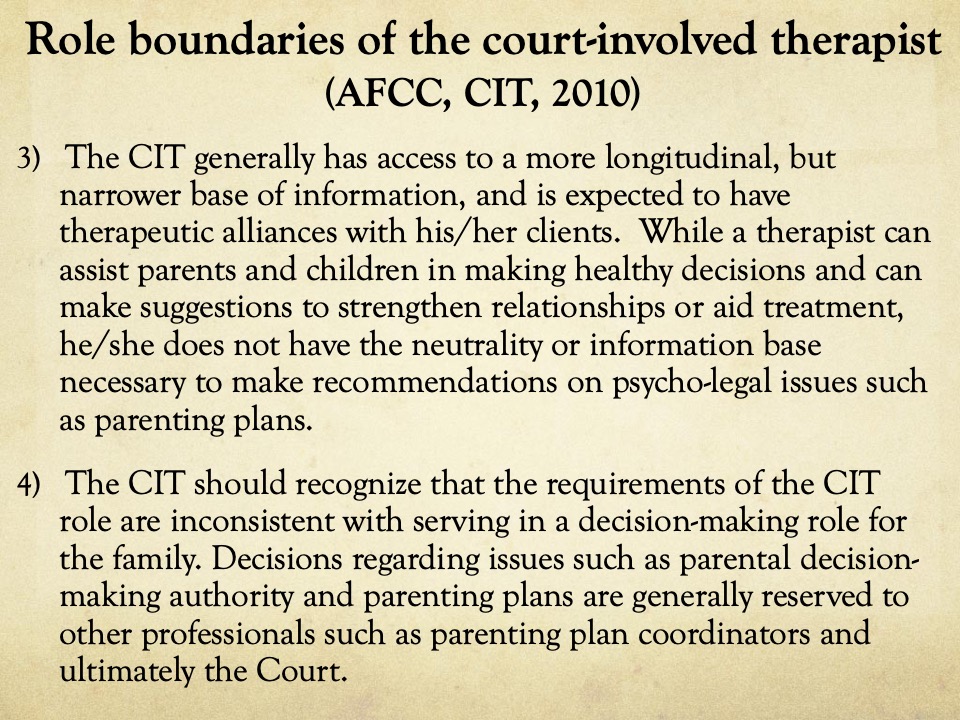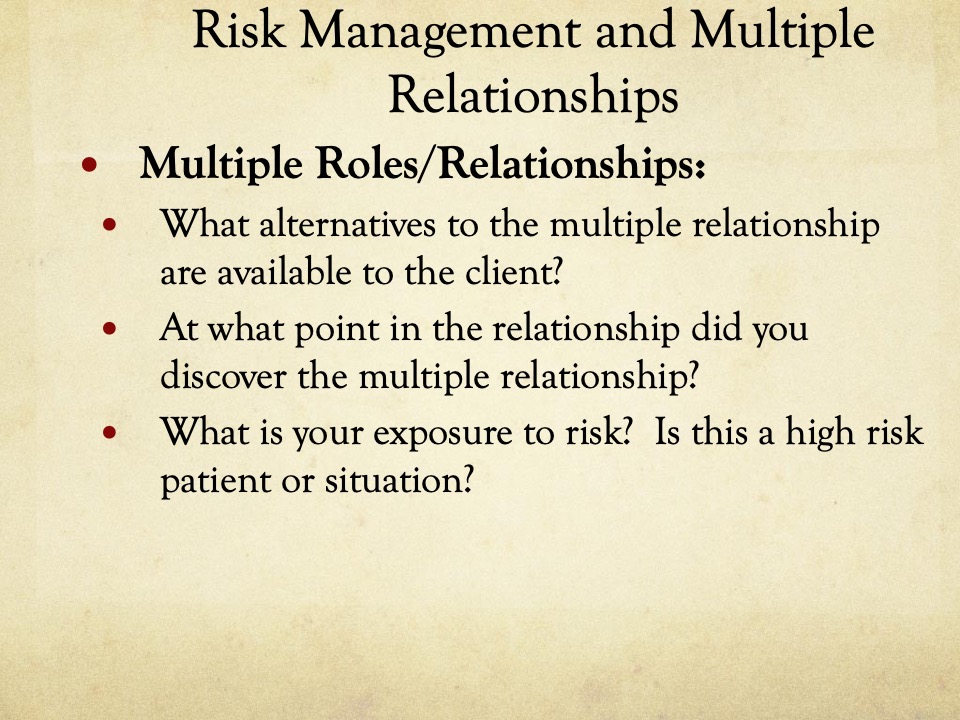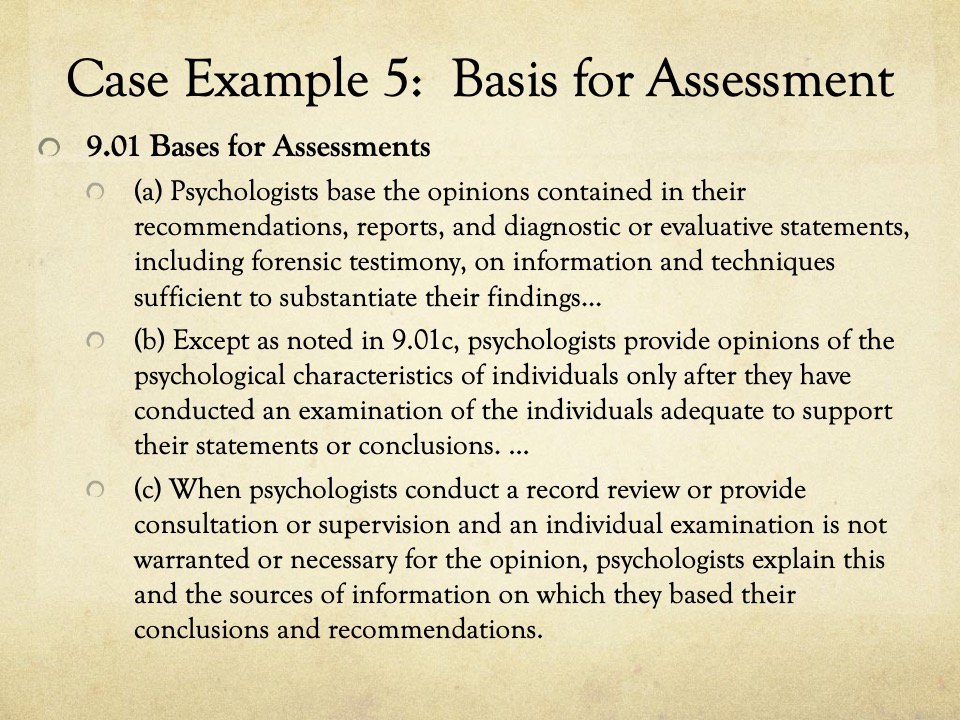Case 5
Here’s another example, which I will use to describe the process of ethical decision-making by a court-involved therapist (CIT):
Here’s another example:
A psychologist, Dr. Z evaluates two children, who are brought in by their father, who had previously been treating with the therapist. The mother is never seen. The parents share joint physical custody.
The children indicate that they strongly prefer to live with their mother.
Based on the children’s statements, Dr. Z diagnoses the mother with “Parental Alienation Syndrome.” She (Dr. Z) believes that the mom has been manipulating the children. She recommends that the children live with their father, andrecommends that mother enter therapy to overcome her parental alienation syndrome.
Parental alienation is a very controversial concept. I could spend several hours on the issue of children who are alienated from their parents (see my post on Blame and Moral Disengagement). This is a distinct phenomenon from children who prefer to live with one or the other of their parents. An extensive evaluation of both parents and of the children is necessary; the issue is often one of testing hypotheses with solid facts and evidence). See my discussion of the irreconcilable difference between treatment and forensic roles.

Let’s assume that the psychologist pauses to consider before she writes a letter to the court diagnosing the mother and making a therapy and custody recommendation.
- What should she consider?:
- What is her role in this case?
- Is there a role conflict involved in her writing this letter; i.e., is she changing roles in a manner which might impair her objectivity and risk harm.
- Is she a forensic expert or a treater? She has treated the father and the children. Could this have affected her opinions?
- Why is she considering writing this letter? Does she have any obligations to her patients, the children? Does she owe any obligation to the mother? Are anyone’s rights at risk with the psychologist writing this letter? Could anyone be harmed?
Perhaps the psychologist has expertise in the area of parental alienation, although I have to say this is a very complex and controversial area. But can she even begin to make a statement about PAS or about the children being alienated from their father?
Perhaps the therapist would be competent to asses mother’s need for therapy, if she had met her, and the mother consented to an evaluation for this purpose which she hasn’t Has she performed an adequate assessment for the purpose of reaching her conclusions? What are the alternatives she should consider?
Should she have seen the kids in the first place?
If she has concerns about PAS what could she do (e.g. recommend an evaluation by a neutral third party?
Ethical Decision-Making
This situation clearly presents an ethical dilemma when the above issues are considered:

What should the psychologist have done?
The key to dealing with any ethical dilemma is an analysis of the situation:
Melba Vasquez, a past APA President (and co-author with Kenneth Pope of the definitive book for psychologist on ethics), did a workshop for Michigan Psychological Association, and presented, among other ideas, a simplified ethical decision-making model (more complex models are in every ethics textbook or casebook). She has stated (in a 2016 presentation available online):
“An ethical dilemma is a situation for which “no course of action seems satisfactory. The dilemma exists because there are good, but contradictory ethical reasons to take conflicting and incompatible courses of action.” (Kitchener, 1984, p. 43)…” She said: “Awareness of ethical codes is crucial, but formal codes cannot take the place of an active, thoughtful, creative approach to our ethical responsibilities.”
She proposed the following decision-making procedure:
- Identify the ethical problem/dilemma. This should be done in writing:
“This situation presents an ethical dilemma because _____________ “
“People have the right to _____________”
This step includes consideration of the APA ethical principles and guidelines and legal factors (see above):
Also client factors: who is the client? Are there multiple clients? When child/family therapy is involved, as in this case, has this question of “who is the client” been made explicit? Have the clients been informed of the reason that they are being seen, the uses that might be made of their statements to the therapist, the limits of confidentiality and privilege? What are their rights and what are our ethical duties to each individual?
2. Identify options and alternatives to consider and potential consequences of each action.
In the case of Dr. Z, what are the alternatives to writing the letter, and what are the potential consequences of each alternative
3. Consult with professionals knowledgeable about ethics.
I can’t stress this step enough. This is probably the key to risk management in dealing with ethical or legal issues.
Takeaway: Consult, Consult, Consult!
4 Consider and evaluate the rights, responsibilities, and welfare of the client and others involved.
This includes a consideration of the potential for harm associated with any alternative course of action
5. Make a and devise and implement a plan for implementation of the decision .
Document the process and the results.

Let’s assume that the psychologist pauses to consider before she writes a letter to the court diagnosing the mother and making a therapy and custody recommendation.
What should she consider?:
What is her role in this case? Is there a role conflict involved in her writing this letter; i.e., is she changing roles in a manner which might impair her objectivity and risk harm. Is she a forensic expert or a treater?
She has treated the father and the children. Could this have affected her opinions?
Why is she considering writing this letter? Does she have any obligations to her patients, the children? Does she owe any obligation to the mother? Are anyone’s rights at risk with the psychologist writing this letter? Could anyone be harmed?
Perhaps the psychologist has expertise in the area of parental alienation, although I have to say this is a very complex and controversial area. But can she even begin to make a statement about PAS or about the children being alienated from their father?
Perhaps the therapist would be competent to asses mother’s need for therapy, if she had met her, and the mother consented to an evaluation for this purpose which she hasn’t. Has she performed an adequate assessment for the purpose of reaching her conclusions?
What are the alternatives she should consider?
Should she have seen the kids in the first place?
If she has concerns about PAS what could she do (e.g. recommend an evaluation by a neutral third party?

Once again, this case involves a multiple relationship:
Dr. Z moved from treating the father to evaluating his children. Assuming that Dr. Z sees herself as the children’s therapist, does her prior relationship with the father jeapordze her objectivity in dealing with the children?
If she sees herself as the children’s evaluator, or forensic expert, does her prior involvement with the father jeopardize her objectivity? If she is a forensic expert, does her failure to contact the mother support the assertion that she is not objective?
Here are some expert thoughts about role-boundaries (from the AFCC Court-Involved Therapist Guidelines):


Dr. Z, by virtue of her treatment relationship with the father, and without a treatment relationship with the mother, does not have the neutrality nor access to information that would be required to diagnose the mother or assess in a neutral nor objective way the psycho-legal issue of the causes of the children’s preferences for their mother nor to make a recommendation which could a) affect the children’s access to their parents in a fundamental way; or b) potentially harm the children and/or their mother. An adequate assessment of the Best Interests of the Children, which is the legal basis for making custody recommendations, will be discussed below.
The psychologist’s multiple roles, relationships and loyalties in this matter not only impairs her objectivity, it also leads the psychologist to the risks: 1) to a lawsuit; 2) to a licensing complaint. The following questions apply to this situation.
A psychologist with this kind of ethical dilemma should consider:

Additionally, the psychologist should consider the following ethical principle (9.01 Bases for Assessment):

Has the psychologist Dr Z satisfied points a and b? I don’t (believe) applies here.
(a) Note that the therapist is recommending therapy for mom, whom he has never seen.
(b) In effect, and his letter bore this out, she diagnosed mom with a mental disorder, parental alienation syndrome (PAS), and recommended treatment for her. Is the children’s reports, combined with dad’s statements (he is not an unbiased source of information) sufficient to diagnose mom.
Note also that there is no accepted (DSM nor ICD) official diagnosis of PAS. Dr. Z might assert that the children have been alienated from their father; but this is not a diagnosis of the mother.
Furthermore, without an assessment sufficient to diagnose the family pattern asserted– ie, that the children have been alienated by the activity of the mother — which is what 9.01 a and b require, there is considerable risk for harm to the children, serious potential violation of mom’s rights, and a potential for harm to the mother and the children?
Dr. Z’s recommendation is therefore unethical.
Furthermore:

Several things are worth noting in case 5:
- Has Dr. Z obtained consent from both parents for making recommendations to the Court regarding the children?
- Has Dr. Z even obtained consent from both parents to see the children? Each parent, under Michigan’s laws, can consent to treatment of a child. But that is a different role than the one the psychologist adopted, that of making a recommendation to the court. The psychologist should not have shifted roles.
- If Dr. Z makes a custody and/or parenting time recommendation, she is engaging in successive multiple roles; she should decline any request to offer an opinion on custody or parenting time matters as this creates a conflict of interest.